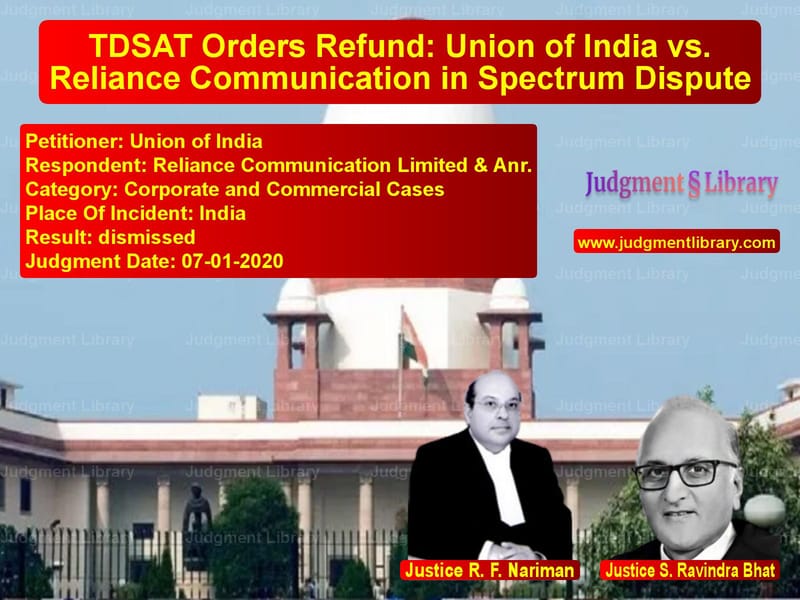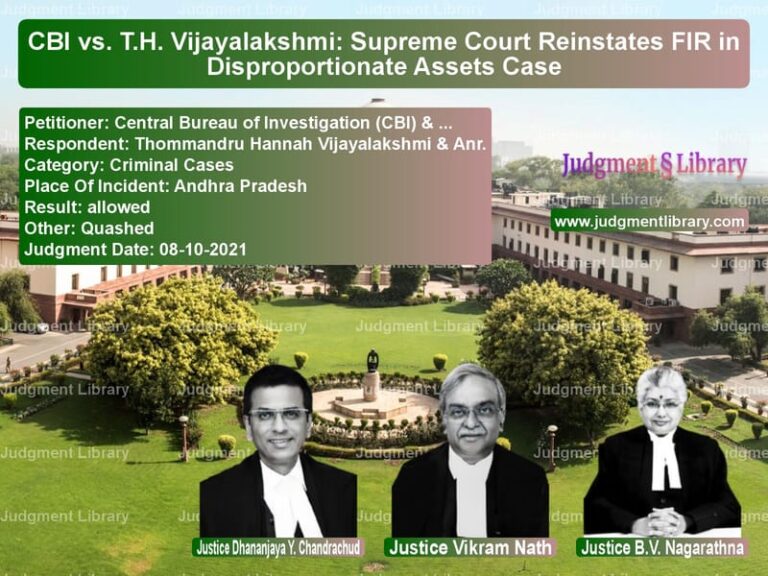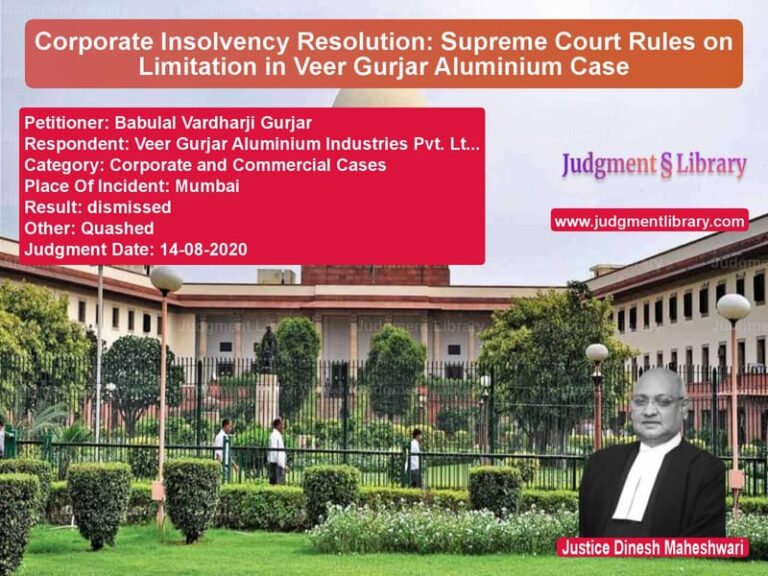TDSAT Orders Refund: Union of India vs. Reliance Communication in Spectrum Dispute
The case of Union of India vs. Reliance Communication Limited & Anr. revolves around a spectrum payment dispute between the Indian government and telecom operators. The matter primarily concerns the encashment of bank guarantees provided by Reliance Communication Limited (RCL) and Reliance Telecom Limited (RTL) and the subsequent demand for a refund of excess amounts encashed by the government.
The Supreme Court upheld the decision of the Telecom Disputes Settlement and Appellate Tribunal (TDSAT), directing the Union of India to refund ₹104.34 crores that were wrongfully retained after the encashment of bank guarantees. The ruling highlights critical aspects of telecom regulations, government accountability, and financial liabilities in the telecom sector.
Background of the Case
The dispute traces back to the spectrum auction conducted by the government:
- In 2013, the Union of India invited bids for the 800 MHz spectrum auction. Sistema Shyam Teleservices Ltd. (SSTL) won the bid and acquired spectrum in eight telecom circles.
- In 2017, SSTL merged with Reliance Communication Limited (RCL), and the spectrum rights were transferred to RCL with government approval.
- In 2015, RCL and RTL participated in another spectrum auction and acquired additional spectrum, making them liable for deferred spectrum payments.
- Due to financial distress, RCL and RTL failed to pay the third installment of ₹281.45 crores and the 2015 spectrum charges of ₹492.79 crores.
- The government encashed bank guarantees totaling ₹908.91 crores against the outstanding liability of ₹774.25 crores.
- Reliance later furnished fresh bank guarantees worth ₹774.25 crores and demanded the refund of the excess ₹134.66 crores.
The government, however, refused to return the excess amount, citing outstanding dues and pending litigation.
Key Legal Issues Considered
- Was the government justified in encashing an amount higher than the outstanding dues?
- Could the Union of India refuse to refund the excess amount despite fresh bank guarantees being furnished?
- Did the TDSAT have jurisdiction to order a refund of the excess amount in an execution proceeding?
- Could the government adjust the excess amount against future liabilities?
Arguments of the Petitioner (Union of India)
- The government argued that as per Clause 4.5b(x) of the NIA (Notice Inviting Application) 2015, it had the right to retain any excess amounts encashed from bank guarantees.
- It contended that Reliance had pending dues and was in default for subsequent spectrum payments.
- The government maintained that TDSAT could not pass an order for a refund in an execution proceeding.
- It asserted that refunding the amount would impact future recoveries from Reliance, which was already under financial stress.
Arguments of the Respondents (Reliance Communication Limited & Reliance Telecom Limited)
- Reliance argued that the government had wrongfully retained ₹134.66 crores, even though they had submitted fresh bank guarantees for the same amount.
- They contended that the government’s refusal to refund the excess amount amounted to unjust enrichment.
- Reliance pointed out that the government had already filed its claims under the Insolvency and Bankruptcy Code (IBC) for outstanding payments and could not arbitrarily retain the excess sum.
- They argued that the TDSAT had the authority to order the refund as part of the execution of its previous orders.
Supreme Court’s Observations
- The Court noted that the total outstanding spectrum dues in May 2018 were ₹774.25 crores, yet the government encashed bank guarantees worth ₹908.91 crores.
- It observed that Reliance had subsequently furnished fresh bank guarantees worth ₹774.25 crores, negating any justification for the retention of excess funds.
- The Court ruled that the government’s attempt to adjust the excess amount against future liabilities was legally unsound.
- It rejected the argument that the execution proceedings before TDSAT were invalid, affirming that the tribunal had the authority to order the refund.
- The Court stated: “There is no rationale for the Union to resist the demand for a refund of excess amounts. Retaining ₹104.34 crores beyond the due amount was unjustified.”
Final Judgment
The Supreme Court upheld the TDSAT ruling and dismissed the appeal filed by the Union of India. The key directives were:
- The Union of India must refund ₹104.34 crores to Reliance Communication Limited and Reliance Telecom Limited.
- The government cannot adjust excess amounts from past bank guarantees against future liabilities.
- The ruling does not prevent the government from initiating fresh proceedings for pending spectrum payments.
This judgment sets an important precedent in telecom regulatory matters, emphasizing financial accountability and fairness in government dealings with telecom service providers.
Petitioner Name: Union of India.Respondent Name: Reliance Communication Limited & Anr..Judgment By: Justice R. F. Nariman, Justice S. Ravindra Bhat.Place Of Incident: India.Judgment Date: 07-01-2020.
Don’t miss out on the full details! Download the complete judgment in PDF format below and gain valuable insights instantly!
Download Judgment: Union of India vs Reliance Communicati Supreme Court of India Judgment Dated 07-01-2020.pdf
Direct Downlaod Judgment: Direct downlaod this Judgment
See all petitions in Bankruptcy and Insolvency
See all petitions in Company Law
See all petitions in Corporate Compliance
See all petitions in Judgment by Rohinton Fali Nariman
See all petitions in Judgment by S Ravindra Bhat
See all petitions in dismissed
See all petitions in supreme court of India judgments January 2020
See all petitions in 2020 judgments
See all posts in Corporate and Commercial Cases Category
See all allowed petitions in Corporate and Commercial Cases Category
See all Dismissed petitions in Corporate and Commercial Cases Category
See all partially allowed petitions in Corporate and Commercial Cases Category







